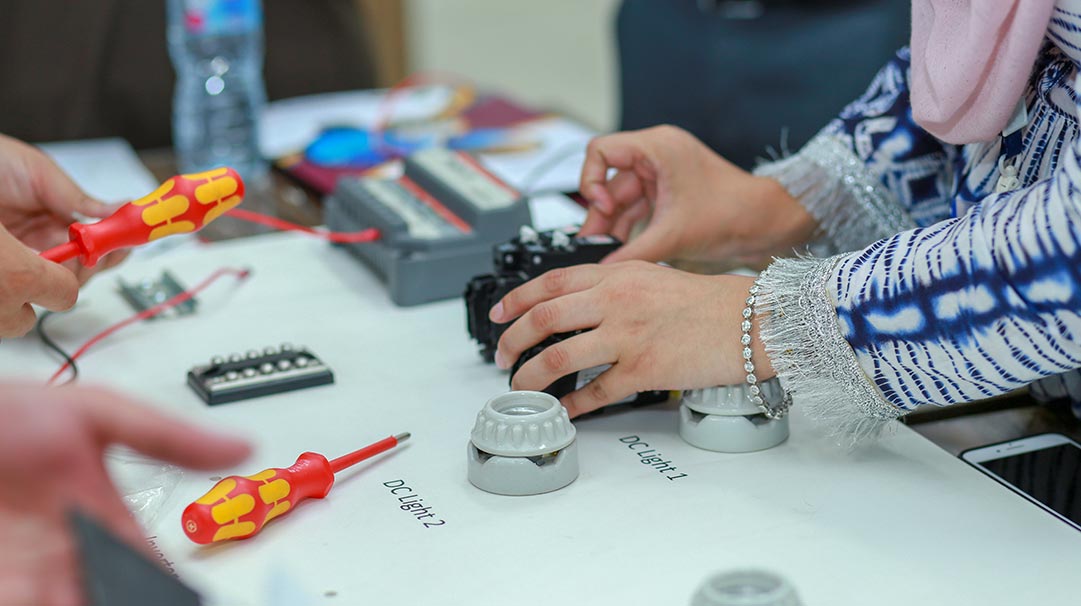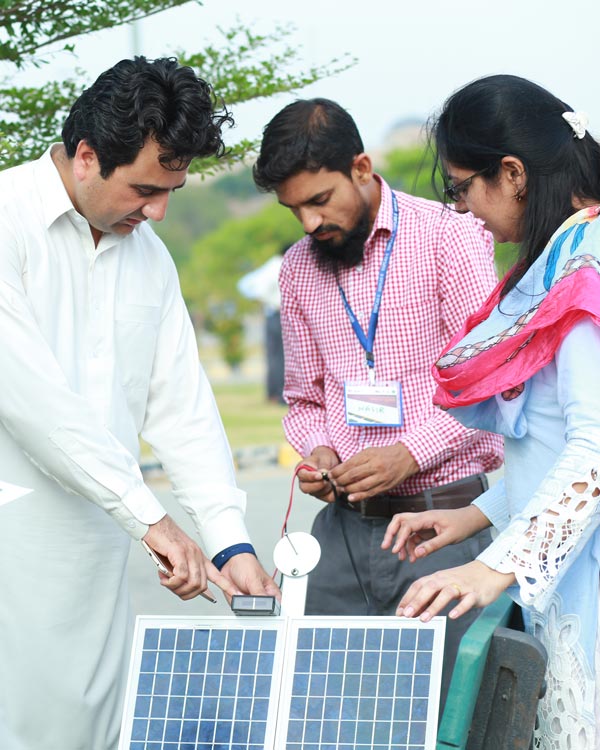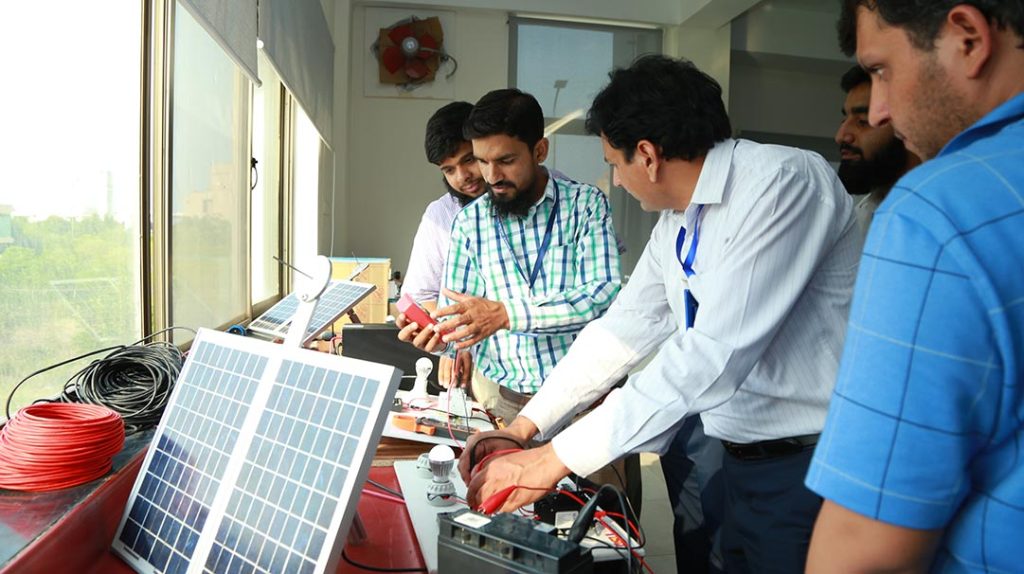Technology Centers set to leverage Pakistan’s enormous solar potential

USPCAS-E Technology Centers set to leverage Pakistan’s enormous solar potential through photovoltaic testing and certification services
The Technology Centers aim to be the dominant player in the solar energy training market
The U.S.-Pakistan Centers for Advanced Studies in Energy at the National University of Sciences and Technology (NUST) and University of Engineering and Technology Peshawar (UET) have realized significant accomplishments in the past five years including nearly 900 enrolled students, the development of 14 new degree programs, many new courses, ongoing stakeholder engagement, and more than 200 graduates. Financial sustainability is key to maintaining this momentum of the centers at NUST and UET Peshawar. By addressing critical energy sector needs, the centers can position themselves as significant training partners for individuals and businesses throughout Pakistan.
Pakistan’s solar industry is facing a huge skills gap and requires experienced workers who can ensure customer satisfaction through quality design and installations. According to the “Value Chain Analysis of Solar PV in Pakistan” report by the German Solar Energy Association and GIZ Pakistan, the country has enormous photovoltaic (PV) potential, and it has all the necessary conditions for its development and implementation. However, there is a lack of specific knowledge and expertise relating to PV in the workforce. Currently, there are no accredited facilities that offer solar PV training. Although the Technical Education and Vocational Training Authority (TEVTA) provides training to students, these are solar energy-specific opportunities.
USPCAS-E at NUST and UET Peshawar are partnering with Arizona State University (ASU) to create Technology Centers to address this gap. These centers will train students and energy sector professionals in Pakistan. The goals: provide solar photovoltaic related research, certification testing, consulting and educational services for individuals as well as for private and public sector organizations in Pakistan. In particular, the primary certification services to be provided are performance and qualification testing of PV modules according to IEC 61215 standards, engineering and design evaluation of PV modules and systems, workforce skills and competency training on the design, installation, and operations and maintenance of PV systems.
Dr. Govindasamy “Mani” Tamizhmani, director of the Photovoltaic Reliability Laboratory at ASU explains: “Currently more than 90% of solar PV modules in Pakistan are being imported, many of which are sub-standard quality. My vision for both technology centers is to become nationally recognized and internationally accredited ‘centers of excellence’ on solar photovoltaic technologies, components and systems.”
The Technology Center training programs began in July 2019 and are designed to be immediately applicable, enabling students and professionals to put their new skills to work directly.
Both technology centers are equipped with unique, state-of-the-art tools and equipment to enable offering the services mentioned above. These centers and their equipment can also be leveraged for research and teaching purposes by faculty and students at NUST and UET Peshawar.
Addressing Market Needs
The Technology Center trainings are specifically designed to attract individuals who are looking to start a new solar business or want to gain or upgrade solar power-focused skills. The target market includes individuals from a variety of positions and backgrounds: inspectors, managers, supervisors, technicians and engineers working in industries, businesses and government agencies. Current students and recent college graduates are also primary target demographics, from new science and engineering graduates to BTECH and DAE students looking to leverage their skills and knowledge in the solar job market.
The competitive advantage of the Technology Centers are the structural relationships with NUST and UET Peshawar, two well-known and respected universities in Pakistan. This relationship aids in name recognition and the marketing of their programs to potential clients throughout Pakistan.
The Technology Centers will provide certified and accredited training in a gender-inclusive learning environment. A hands-on approach will facilitate an applied learning environment fully equipped with the latest equipment and technologies. In the absence of viable alternatives in Pakistan, NUST and UET PESHAWAR have the unique opportunity to leverage the significant investments, human capacity and equipment in the creation of the technology centers as part of the USPCAS-E program to increase the brand recognition of USPCAS-E in Pakistan through attractive and market required skills, research, product and system services.
 Train-the-Trainer Approach
Train-the-Trainer Approach
Arizona State University conducted a five-day train-the-trainer workshop at NUST for faculty and representatives of the solar PV industry. Each trainee learned to deliver training programs that provide vocational proficiency in the application, design, installation and operation of residential and commercial solar PV systems. They also learned how to conduct PV power plant surveys, how to identify potential material, safety and performance-related issues, and how to conduct analyses on the impact of these issues on long-term energy production for solar PV power plants in Pakistan.
Bülent Bicer, project manager at the Photovoltaic Reliability Laboratory at ASU and the instructor of the workshop explained: “A successful market penetration of renewable energy systems requires an enabling policy framework, high-quality products and a skilled and competent workforce. The focus of this train-the-trainer workshop was to provide internationally accepted best practices and skills in the design, installation and operations of solar PV energy systems in Pakistan. Each trainee was provided with all training materials with the expectation to further disseminate the learned knowledge to professionals, technicians and students through short programs and courses.
The five-day training focused on the fundamentals, design, installation and operations of PV energy systems based on international best practices, such as those promoted by the North American Board of Certified Energy Practitioners (NABCEP).
Both NUST and UET Peshawar are committing classroom and lab resources as well as key personnel. USPCAS-E NUST and USPCAS-E UET Peshawar have dedicated space to host training and lectures. The Technology Center personnel will offer short technical training programs. At NUST, the key personnel for the Technology Center are faculty member Dr. Hassan Abdullah Khalid and staff member Mudassir Ayub. At UET Peshawar, the key personnel are Assistant Professor M. Arif Khattak, Technology Center Lead Muhammad Arif, Industrial Liaison Manager Ms. Shaista Afridi, and Lab Engineer Ms. Noor Saif.
These staff members visited ASU for hands-on training at the Photovoltaic Reliability Laboratory at ASU’s Polytechnic Campus, a lab headed by Govindasamy “Mani” Tamizhmani. The three-week training at ASU-PRL (ASU Photovoltaic Reliability Lab) focused on providing the technology center staff from NUST and UET PESHAWAR with the fundamental knowledge of conducting PV module qualification testing activities required by the IEC 61215 standard.
Noor Saif from UET Peshawar said, “My training focused on laboratory-based testing, both indoor and outdoor. This particular activity experience greatly benefitted me in understanding what actual results can be achieved under real-time testing conditions along with the fact that what external or internal factors could hinder or favor our test results. I learned about all the quality tests that are performed under IEC 161215 and most importantly I had open access to all the latest equipment that are used in the lab and the safety procedures that we shall adopt while doing a test. I got the idea of how we are going to establish our lab in Pakistan and what else we needed in terms of equipment, area, logistics, human resources, and safety measures.”
Arif Khattak from UET Peshawar said, “The training provided a model of how to establish and run the technology center at UET Peshawar. ASU provided major help in the selection and procurement of the most relevant equipment.”
The Technology Centers will also focus on continuous program assessment to provide the highest quality training and services. Continuous improvement efforts will include ongoing monitoring and feedback collection so the centers can determine what’s working – and what’s not – to adjust the offerings to meet market needs.

Ensuring the long-term sustainability of the Centers for Advanced Studies in Energy at NUST and UET Peshawar
The technology centers provide dedicated value-add services to the public and private sector in Pakistan on solar photovoltaic related technologies. The services to the public sector would include training the trainers and technicians for university graduates and technical school graduates; technical assistance to government procurements during tender processes and international product import processes; and independent evaluations of PV power plants maintained and operated by public entities. The services to the private sector would include product certification testing, engineering testing of products and systems, independent EPC (Engineering Procurement and Construction) evaluations and O&M (Operations and Maintenance) evaluations. These services will be promoted and marketed in line with country-specific climatic conditions and pricing. The generated revenue will enable the centers to become financially self-sufficient after a short period. Interaction with the private industry and public organizations is crucial for the long-term success and sustainability of both centers. For this reason, NUST and UET Peshawar have assigned dedicated individuals for outreach/marketing activities.
Hassan Abdullah Khalid from NUST explained, “Such a facility will generate revenue by not only providing PV module testing and certifications but also providing additional consultancy and engineering evaluation services to the local industry/PV plants in Pakistan.”
The Technology Centers at a glance:
|
Objective |
Provide solar PV training to individuals in the public and private sector |
|
Products/Services |
|
|
Potential Customers |
|
|
Positioning |
|